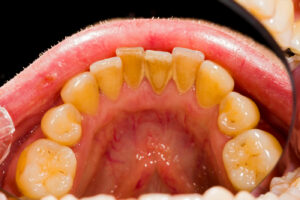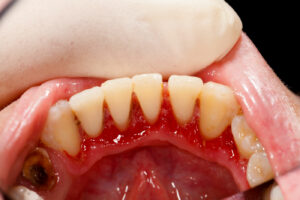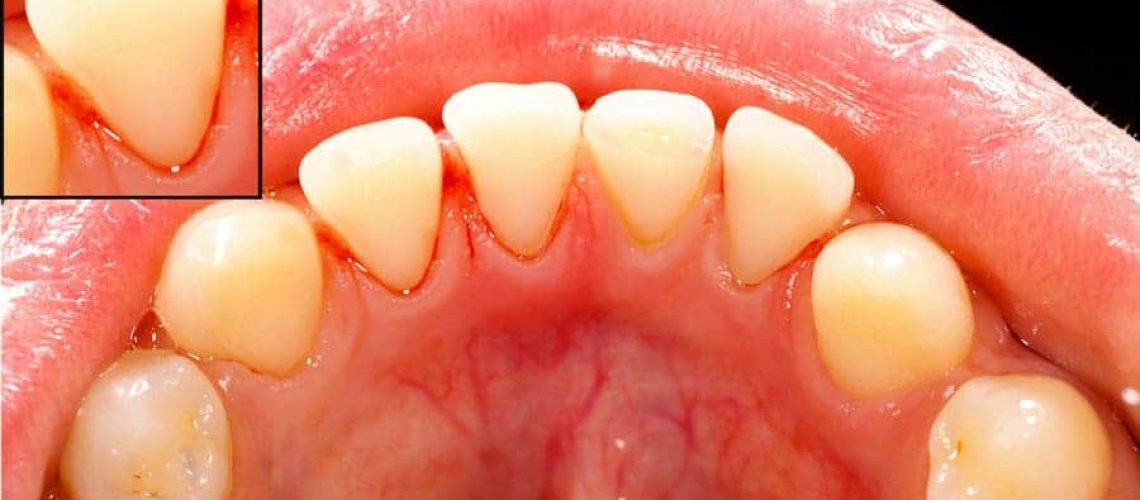Your gums are becoming more sensitive, there’s more blood in the sink when you brush, and you have persistent bad breath that you can’t seem to get rid of—these are telltale signs of gum disease, also called periodontal disease. But where does it come from? And more importantly, can it be cured?
There’s good news and bad news, but first:
What Causes Gum Disease
 As is the case with most dental health problems, the main culprit in gum disease is plaque.
As is the case with most dental health problems, the main culprit in gum disease is plaque.
When left to fester on the teeth and gums, this acidic and bacteria-ridden substance can trigger an immune system response from the body, causing the gums to become inflamed.
Inflammation is one of the body’s primary ways of protecting itself from infection and injury. In the case of gum disease, it’s not effective in stopping the bacteria from causing damage, however.
The inflammation actually makes the gum tissue tender and susceptible to further infection, which can then spread to the bone that supports the teeth. This can cause loose teeth and tooth loss, receding gums and other serious problems.
In fact, gum disease and inflammation can lead to serious health problems like heart disease, Alzheimers and even early death!
However, this doesn’t mean that simply having gum disease means you’re doomed. There are treatments available that can stop the damage and even reverse it in many cases!
Gum Disease Risk Factors
Some people are more susceptible to gum disease than others. There are a few different factors that can increase your risk:
- Age: Older adults are more likely to develop gum disease, although it can occur at any age.
- Smoking: Smoking tobacco is a major risk factor for gum disease.
- Diabetes: People with diabetes are more susceptible to infection, including gum disease.
- Poor oral hygiene: Not brushing and flossing regularly can lead to gum disease.
- Genetics: Gum disease tends to run in families, so you may be more likely to develop it if your parents or other close relatives have it.
- Certain medications: Certain medications, such as steroids and cancer treatments, can make you more susceptible to gum disease.
While anyone can develop gum disease, if any of the above apply to you, it’s especially important to practice good oral hygiene and see your dentist regularly.
Stages of Gum Disease
 The early form of gum disease, called gingivitis, is relatively mild and only involves slight pain, excessive bleeding and chronic bad breath. It can be cured with improved dental hygiene. You can do this at home, or supplement with professional cleanings at the dentist.
The early form of gum disease, called gingivitis, is relatively mild and only involves slight pain, excessive bleeding and chronic bad breath. It can be cured with improved dental hygiene. You can do this at home, or supplement with professional cleanings at the dentist.
If you have gingivitis, it’s important to act fast—if it’s allowed to fester, it can develop into periodontitis, a more advanced stage of gum disease that can cause tooth loss, receding gums and other serious problems. Periodontitis is also far more painful and can cause both personal and social problems.
There are essentially four stages of gum disease: gingivitis, mild periodontal disease, moderate periodontal disease and advanced periodontal disease.
While there is currently no cure for moderate-to-advanced periodontitis, there are treatment options available. These include scaling and root planing, which involves deliberate gum recession and removal of tartar from the tooth roots, as well as antibiotics to help control the gum infection. In severe cases, surgery may be necessary.
How To Prevent Gum Disease
 Fortunately, there are a number of things you can do to prevent gum disease in the first place. A consistent oral hygiene routine needs to be following, which involves brushing at least twice a day, flossing once a day and using mouthwash.
Fortunately, there are a number of things you can do to prevent gum disease in the first place. A consistent oral hygiene routine needs to be following, which involves brushing at least twice a day, flossing once a day and using mouthwash.
When brushing, it’s important to brush along the gum line to keep plaque from staying there too long.
In addition, you should see your dentist on a regular basis for professional cleanings and checkups.
Some holistic options for preventing gum disease include quitting smoking, reducing stress levels and eating a healthy diet. It’s also important to avoid sugary and acidic foods and drinks, as they can contribute to the development of gum disease.
If you are already suffering from gum disease, it is not too late to take action! Be sure to visit your dentist as soon as possible to discuss your treatment options. By taking care of your oral health, you can help healthy gums and teeth for years to come.





